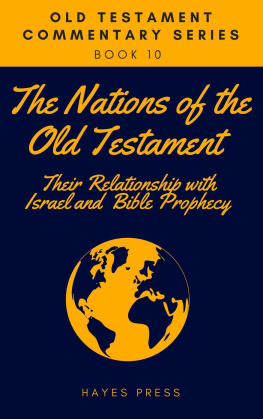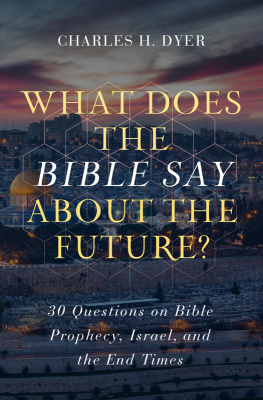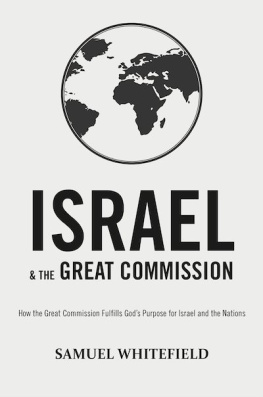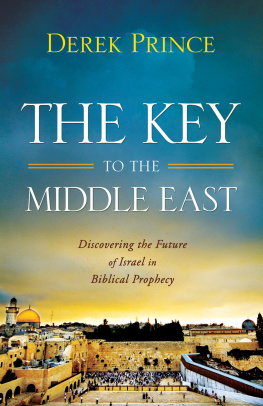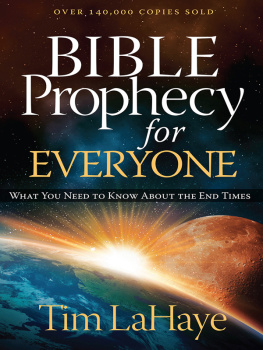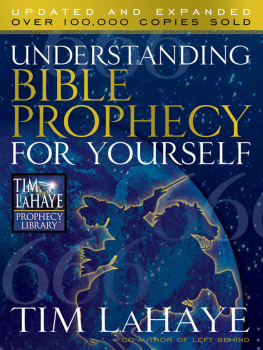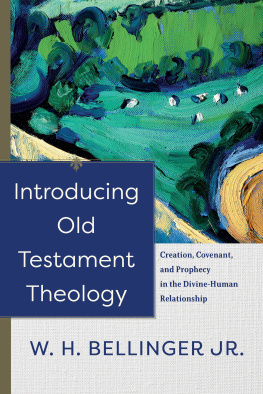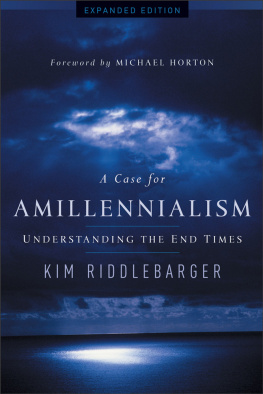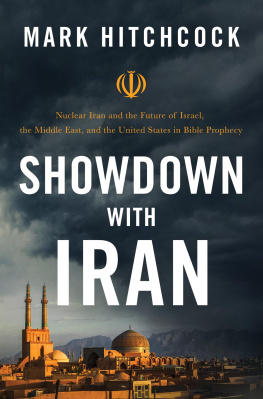THE NATIONS OF THE OLD TESTAMENT:
THEIR RELATIONSHIP WITH ISRAEL AND BIBLE PROPHECY
COMPILED BY HAYES PRESS
Copyright Hayes Press 2017
All rights reserved. No part of this book may be reproduced, stored in a retrieval system, or transmitted in any form, without the written permission of Hayes Press.
Published by:
HAYES PRESS Publisher, Resources & Media,
The Barn, Flaxlands
Royal Wootton Bassett
Swindon, SN4 8DY
United Kingdom
www.hayespress.org
Unless otherwise indicated, all Scripture quotations are from The ESV Bible (The Holy Bible, English Standard Version), copyright 2001 by Crossway, a publishing ministry of Good News Publishers. Used by permission. All rights reserved. Quotations marked RV or RV margin are from the Revised Version Bible (1885, Public Domain).
CHAPTER ONE: THE PHOENICIANS (GEORGE PRASHER)
T yre and Sidon, two cities on the Phoenician seaboard north of Israel, are frequently linked in Biblical references. They stand for the great maritime power developed from Phoenicia, a power which reached out through its merchant and naval shipping to the far boundaries of the ancient world. Notice is taken of Tyre in the book of Joshua, for the border of Asher reached "to the fortified city of Tyre. (Joshua 19:29). Five hundred years later, as Joab reluctantly conducted the national census for David, he came to Dan, and from Dan they went around to Sidon, 7 and came to the fortress of Tyre (2 Samuel 24:6-7). So the influence of Tyre and Sidon, abutting the extreme northern border of Israel, was a political factor with which the kings of Israel and Judah were concerned. The four centuries from David until Jehoiakim saw the rise of Tyre and Sidon to the zenith of their influence and power.
Scripture discloses a cordial relationship between Hiram, King of Tyre, and David and Solomon. Hiram always loved David (1 Kings 5:1), and sent him cedars to provide material for his house (2 Chronicles 2:3). This economic co-operation was carried forward into Solomon's reign. Hiram supplied not only fir and cedar in return for wheat and oil (2 Chronicles 2:15-16), but also a highly skilled craftsman (2 Chronicles 2:13-14). This friendliness in the times of David and Solomon later gave place to enmity and rivalry. Allusions to Tyre and Sidon during the prophetic period under review were consistently in terms of judgement against them, often linked with references to their enmity against God's people. Why this change of attitudes? It may have derived from Hiram's disappointment in the cities of Galilee which Solomon offered to him as a gift. For Hiram called them land of Cabul (meaning dry, sandy), and chided Solomon: What kind of cities are these that you have given me, my brother? (1 Kings 9:10-14).
Israel's hegemony of the middle eastern nations was broken after Solomon's death, when the predicted division of the kingdom came to pass. This thing is of Me, were the LORD's words through the prophet to Rehoboam, and that word extended to the waning influence of Israel in relation to Tyre and Sidon as well as other countries. Nevertheless the very proximity of Tyre and Sidon to Israel's northern border encouraged trade relations. These are referred to in Ezekiel 27:17 - Judah and the land of Israel traded with you; they exchanged for your merchandise wheat of Minnith, meal, honey, oil, and balm. Mutual distrust and conflicting interests would doubtless engender political and economic rivalry. Of Sidon it was later written, there shall be no more a brier to prick or a thorn to hurt them among all their neighbors who have treated them with contempt. Then they will know that I am the Lord God. (Ezekiel 28:24).
The attitude of Tyre to Israel's discomfiture under the oppression of Assyrian and Chaldean invaders is significant: Tyre said concerning Jerusalem, Aha, the gate of the peoples is broken; it has swung open to me. I shall be replenished, now that she is laid waste (Ezekiel 26:2). Israel had commanded certain important trade routes from Tyre to other middle eastern areas, so her destruction was seen by Tyre as a political advantage.
Allusions to Tyre and Sidon in certain Old Testament prophetic books present a fascinating impression of the greatness to which they attained, and the foundation on which their greatness was built. Scriptural references accord convincingly with secular history's accounts of the Phoenician maritime empire, illustrating yet again the vivid accuracy of the Old Testament prophets as they described the contemporary situation. Such references may be conveniently summarized under three headings:
1. Maritime Greatness
you who were inhabited from the seas, O city renowned, who was mighty on the sea (Ezekiel 26:17).
Tyre, who dwells at the entrances to the sea, merchant of the peoples to many coastlands (Ezekiel 27:3).
So you were filled and heavily laden in the heart of the seas (Ezekiel 27:25).
2. Political Power
Persia and Lud and Put were in your army as your men of war. They hung the shield and helmet in you; they gave you splendor. 11 Men of Arvad and Helech were on your walls all around, and men of Gamad were in your towers (Ezekiel 27:10-11).
3. Material Wealth
Tyre ... heaped up silver like dust, and fine gold like the mud of the streets (Zechariah 9:3).
Tarshish did business with you because of your great wealth of every kind...Many coastlands were your own special markets (Ezekiel 27:12,15).
with your abundant wealth and merchandise you enriched the kings of the earth (Ezekiel 27:33).
As with so many other gifted and prosperous peoples, power and wealth led Tyre to a state of overweening pride:
O Tyre, you have said, I am perfect in beauty' (Ezekiel 27:3).
... you make your heart like the heart of a god (Ezekiel 28:2).
So much so that by the inspiration of the Spirit Ezekiel was moved to reveal the pride and sin of Satan within the context of his burden regarding Tyre. For the prince of Tyre is represented as having a heart so lifted up in pride as to say, I am a god, I sit in the seat of the gods, in the heart of the seas, (Ezekiel 28:2), or as the Revised Version translates this: "... I sit in the seat of God." This lofty presumption in the rulers of contemporary Tyre is then projected back under the figure of the king of Tyre to the great crises of Satanic presumption against God, long before human history began:
raise a lamentation over the king of Tyre, and say to him, Thus says the Lord God: You were the signet of perfection, full of wisdom and perfect in beauty ...You were an anointed guardian cherub ...Your heart was proud because ofyour beauty ... I cast you to the ground (Ezekiel 28:12-19).
Here we find one of those masterpieces of divine revelation which command our awe and wonder. For through greatness and ability and power Tyre had been permitted to attain dazzling heights of human achievement. Forgetting that this was all of divine permission and enablement, she affronted God with her self-glorying. Here was an illustration in human experience through which God could convey to human thought the tragic elements of Satanic presumption against the prerogatives of Deity.
Religious Influences Upon Israel and Judah
There was a phase of Israel's experience when the false religion of the Phoenicians made serious inroads. This stemmed from a political move by Ahab, the son of Omri, who took Jezebel, the daughter of Ethbaal, king of the Zidonians, to be his wife (1 Kings 16:31). Was it with a view to political advantage that Ahab schemed to gain by association with the wealthy northern Phoenician power? His action was in defiance of God's word (Deuteronomy 7:3); it led Israel into even deeper spiritual decadence than what followed from the apostasy of Jeroboam the son of Nebat, originator of the worship of the golden calves in Dan and Bethel (2 Kings 13:11). For with Jezebel was imported the worship of Baal, chief male deity of the Phoenicians, and under the queen's forceful imposition the northern kingdom was soon given over to this religion.
Next page
